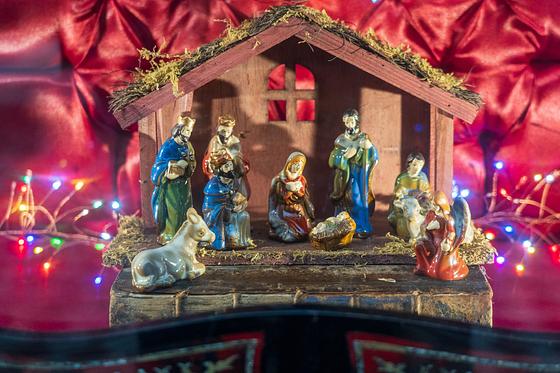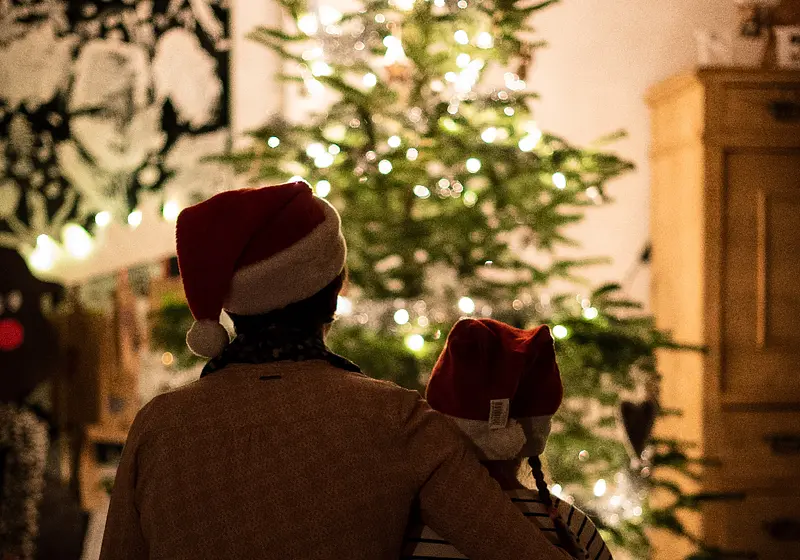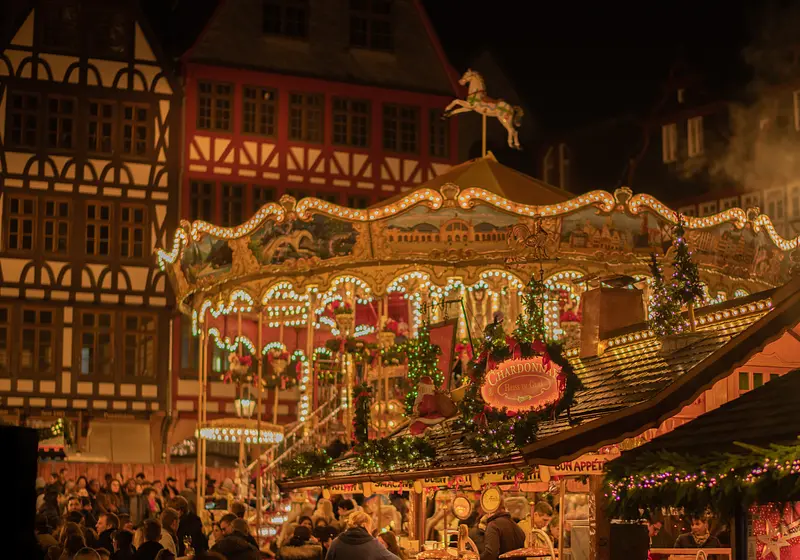With Christmas right around the corner, America is decked out for the occasion. Kids exchange Secret Santa gifts, colored lights are hung up in front of houses, and symbolic evergreen trees have popped up inside houses. With Target transforming into holiday gift central, and Christmas songs rising as trending TikTok sounds, it can seem like the whole world is united under this holiday.
According to an updated article by Pew Research Center in 2017, 90% of Americans celebrate Christmas. Depending on where you live, this 90% is most likely the majority. But what about the 10% that don't celebrate Christmas?
Let us slide into your dms 🥰
Get notified of top trending articles like this one every week! (we won't spam you)Christmas From a Teen Who Doesn't Celebrate Christmas
As a teenager who grew up not celebrating Christmas, the holiday season brings mixed emotions. At times, it can feel awkward when I hear my friends talking about their plans for Christmas. At other times, I feel excited when I see beautiful colored decorations at night.
Most of the time, however, I feel neutral about the holiday, as there is nothing for me to specifically look forward to. However, even though I don't celebrate Christmas, I still participate in fun traditions! I participated in my friend's Secret Santa, and one year, we built gingerbread houses together.
As someone who is friends with many teens who celebrate Christmas, I do not feel resentment against anyone who celebrates this holiday! However, this understanding needs to go both ways. I don't feel like an outcast at Christmas unless someone makes me feel that way. Learn how to properly respond to someone who does not celebrate Christmas in spite of any surprise or confusion you may have!
How Should I React To Someone Who Doesn't Celebrate Christmas?
In most places in America, people are assumed to celebrate Christmas. Grocery store cashiers ask kids what Santa's getting for them this year. Christmas deals show up in everyone's inbox. However, what if you ask someone what their Christmas plans are, and they respond with "I don't celebrate Christmas." What should you do then?
First, refrain from acting overly appalled that the person does not celebrate Christmas. Although that person is probably used to reactions like that, those reactions get annoying. Additionally, refrain from jumping to conclusions about that person over their holiday decisions.
Saying things like "So you're not Christian?" can be offensive. A larger number of people celebrate Christmas in a non-religious way, and their decision not to celebrate it may have nothing to do with religion. If it does have to do with religion, as discussed, there are some sects of Christianity and other religions that don't celebrate Christmas.
Finally, don't look at that person's decision from the viewpoint of the majority. My least favorite reaction that I've gotten is: "But everyone celebrates Christmas!" or, "That's kind of weird." Although it can take a second to absorb the fact that someone doesn't celebrate Christmas, the key to understanding them is accepting that there are different customs from family to family, and ultimately, celebrating Christmas, or any holiday, is a choice.

Image Credit: Photo by Sebastian Bill on Unsplash

Take the Quiz: Which Generation Matches Your Personality?
Discover the generation you truly belong to!
Why Don't Some People Celebrate Christmas?
There are a few reasons why someone wouldn't celebrate Christmas. First, religious beliefs. Some religions, even some Christians, do not celebrate Christmas.
Next, the celebration of other winter holidays instead. Although other holidays are often celebrated along with Christmas, others, like Hanukkah, are celebrated without it. Finally, personal choice. Celebrating any holiday is an option that some people choose not to take.
One sect of Christianity that traditionally does not celebrate Christmas is Jehovah's Witnesses. Some Jehovah's Witnesses do not celebrate Christmas. They have a few main reasons for not partaking in the celebration.
First, Jehovah's Witnesses believe that Christmas is rooted in pagan traditions and customs. Secondly, they point out there is no proof in the Bible of Jesus's birthday being on December 25th. Third, according to Luke 22:19, 20, Jesus commanded that we should celebrate His death- not birth. Although some Jehovah's Witnesses are a sect of Christianity that does not celebrate Christmas, there are other religions as well, as well as other reasons that a person wouldn't celebrate Christmas. Some people simply would rather spend the day doing something else, or just aren't in a celebrating mood. However, many might be celebrating other traditional winter holidays around the world.
It is important to be informed about winter holidays to understand other people's customs, which they might do in addition, or instead of Christmas. Hanukkah, Kwanzaa, and Las Posadas are similar to Christmas in the respect that each of them includes quality time with others and eating food. However, each of these holidays has traditions that make each of them unique!
Hanukkah
Hanukkah, a Jewish holiday, celebrates the struggle and victory of Jews fighting for their religious beliefs. Hanukkah is based on a historical event in Jerusalem, Israel. Thousands of years ago, King Antiochus invaded Jerusalem to try and force the Jewish people there to worship foreign gods.
He destroyed their place of worship, a temple. However, a group of Jews, the Maccabees, fought against the king and won. Returning to their temple, the Jews found the menorah to still be in good shape, despite the destruction of the rest of the temple.
However, the menorah only had oil left to last for one day. The Jews decided to light it anyway. However, instead of lasting for just one day, the menorah burned for eight days: a true miracle. Commemorating this miracle, Hanukkah lasts for 8 days.
Instead of a menorah, today Jews use a hanukkiah, which includes a ninth candle, the shamash. The shamash is taller than the rest of the candles and is used to light the other eight candles. Jews celebrate with foods, among which are latkes and jelly donuts.
They also exchange gifts and play dreidel. The dreidel has one Hebrew letter on each side, which translates to "a great miracle happened there," if you live outside Israel, or "a great miracle happened here," if you live in Israel. Hanukkah is an opportunity for families to get together and remember their Jewish origins!
Kwanzaa
Kwanzaa is an African-American holiday started by Dr. Maulana Karenga in 1966. He created this holiday to attempt to unite people of African descent all over the world.
Kwanzaa lasts for seven days, from December 26 to January 1. Each day corresponds to seven different principles: unity, self-determination, collective work and responsibility, cooperative economics, purpose, creativity, and faith. These principles are also represented by seven different candles on a candle holder, or the kinara.
The kinara holds specifically colored candles. The middle candle is black, representing the people. The three red candles represent the blood, and the green candles represent the earth, and the hard work that is built upon that earth. To celebrate, families gather together, and on December 31, people celebrate with a feast consisting of foods from many different African countries.
Las Posadas
Las Posadas is a religious festival commemorating Mary and Joseph's journey to find shelter in Bethlethem. Due to a mostly Catholic population, Las Posadas is mainly celebrated in Mexico, but it is also celebrated in other Spanish-speaking countries and parts of the US. Each night from December 16 to December 24, the community gathers to create a procession to reenact Mary and Joseph's journey.
Kids are chosen to play the roles of Mary, Joseph, and angels. They use candles to light the way. The procession stops at houses, singing their request to be let inside.
The owners of the houses sing back their refusal, and the procession is on its way. However, at the last, pre-designated house, the owners invite the procession inside. People celebrate with food such as tamales and el ponche.
The last day of Las Posadas is Christmas Eve. On that day, people attend a midnight church service ending with a fireworks show to then kick off their Christmas celebration!

Image Credit: Photo by Nick Fewings on Unsplash
Hanukkah, Kwanzaa, and Las Posadas are three major winter holidays celebrated around the world and in the US. People who celebrate them may celebrate Christmas in addition, or not at all. In the US, Christmas is celebrated by the exchanging of gifts.
Businesses thrive off this gifting frenzy, and sometimes release holiday sales or come out with Christmas-themed products. Families set up trees in order to put their gifts underneath, and some put up stockings over the fireplace as well. This holiday is an opportunity to see family that many take advantage of.
Over winter break, many families travel to see their relatives, and plane ticket prices increase. Christmas is truly a national holiday, and many Americans are swept up in the festivities. However, some people, like certain religious groups, and people who celebrate certain winter holidays, choose not to celebrate Christmas.
This group is the minority, and it can be hard to understand their choices. However, the key to understanding someone who does not celebrate Christmas is understanding their unique viewpoint. By being informed about other winter traditions, and knowing what to say to others who have different traditions than you, we can make this holiday season welcoming for everyone! Ultimately, be proud of your traditions and respect other people's customs as well!

Image Credit: Photo by Clint Patterson on Unsplash











